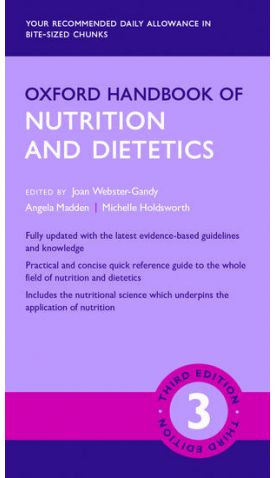אנו משתמשים ב-Cookies כדי לשפר את החוויה שלך. כדי לקיים ההנחיה החדשה של e-Privacy, עלינו לבקש את הסכמתך להגדיר את ה-Cookies. קבלת מידע נוסף.
Oxford Handbook of Nutrition and Dietetics
- Fully updated with the latest evidence-based guidelines and knowledge
- Practical and concise quick reference guide to the whole field of nutrition and dietetics
- Covers the important and growing problem of obesity
- Includes the nutritional science which underpins the application of nutrition
- Covers the entire lifecycle from preconception to old age
New to this Edition:
- Entire content updated to give the current knowledge, recommendations (e.g. school meals), and guidance from NICE and other professional bodies (e.g. obesity, irritable bowel disease guidance from the IBD standards group).
- Revisions to reflect UK governmental reorganisation of the Food Standards Agency (FSA)
- New specialist contributors to cover updated topics such as inherited metabolic disorders in adults
The importance of nutrition in the prevention and treatment of disease and the maintenance of good health is being increasingly recognised. Nutrition is an area that all health professionals need to be aware of and yet one in which few are specifically trained. However it is now becoming a valued topic in many curricula. The Oxford Handbook of Nutrition and Dietetics makes this information more accessible to dieticians, doctors, nurses, nutritionists, and other healthcare professionals by providing a practical, easily accessible, concise and up-to-date evidence-based guide in a user-friendly portable handbook. It covers the entire life cycle from preconception to old age. As the general public is increasingly aware of the food they eat and the role nutrition plays in health and disease, health professionalsmust have the kind of knowledge in this book at their fingertips.
| מהדורה | 3rd edition |
|---|---|
| פורמט | Paperback |
| הוצאה לאור | Oxford |
| תאריך יציאה לאור | 8 ביולי 2020 |
| תוכן עניינים | 1:Introduction to nutrition |
| Author | Joan Webster-Gandy, Angela Madden, and Michelle Holdsworth |


Login and Registration Form